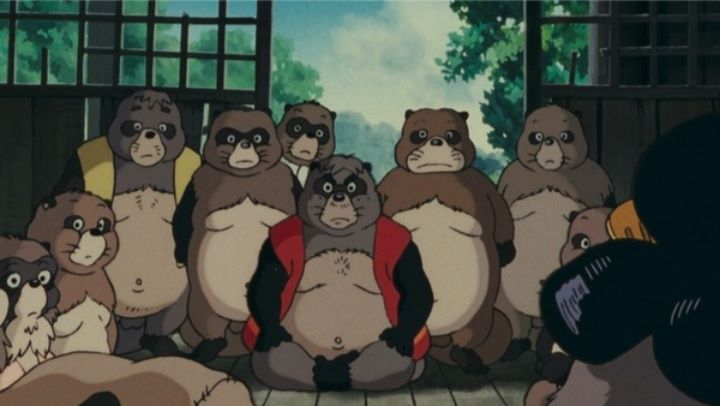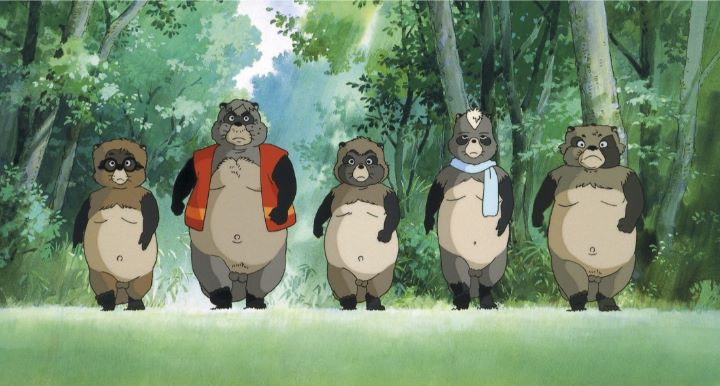








I don't think I've ever seen a film quite like "Pom Poko." The film was released by Studio Ghilbi in1994, and would be dubbed and released by Walt Disney Studios about a decade later. Directed by Isao Takahata, the story deals with themes of tradition, of progress, of nature versus man, of love and loss, all with proudly Japanese mythos and tropes. This results in the two leading factors is "Pom Poko's" unique style: it features talking raccoon-like animals called "tanuki," and is portrayed as a pseudo-documentary, complete with a narration by Maurice LaMarche in the English dub, a profilifc voice actor best known for voicing the smarter half of "Pinky and the Brain." The English dub hasn't aged perfectly, but that alone should be enough to justify watching this once in English!Anyway, a tribe of Japanese tanuki find themselves at odds with the continuing urban development by humans near Tokyo. With their home in danger and with food in ever-limiting supply, the tribe decides the time has come for them to take action. At least, they try to... most of the tanuki are content eating or playing games, or lazily watching a stolen human television. Strangely, the politics within the tanuki are divisive, some eager to rebel and attack the humans while others think it's best to stay out of their way. Eventually, some of the tanuki do take action, making use of their supernatural ability to transform their bodies to trick or scare the human workers in a variety of ways. Ultimately, nothing really works, ending the film in a solemn note where the characters are simply happy to have survived, even though their home as they know it, and many of their friends and family, are forever lost.It's a very direct and political story. While not subtle, the basic plot would be copied in other animated films eager to save the planet in other ways. Even though the purpose of the movie is clear from the start, its impressive how much effort is put into building the world and culture of the tanuki animals. They have their own factions, with multiple leaders arguing with each other, and disapproval over other animal tribes (such as the other shape-shifting group, the "kitsune"). Most of the tanuki are shown as young boys and girls at the start of the movie, growing up to learn how to shape-shift, then having families and children of their own. The story seems to grow without end, and in the perspective of a documentary, it might feel like it lacks direction. This affects the viewing experience a little, but does keep the story interesting until the end, and keeps me invested in the individual characters.And more importantly, "Pom Poko" is surprisingly funny. Most of the tanuki, even the elders, can be lazy in their party-loving ways, even when such attitudes put their livelihood at risk. When they shape-shift into humans, demons or inanimate objects, they can be quite clever in how they pull pranks, at some points having fun scaring human construction workers as well as feeling pride in saving their home. A big part of their power is being able to use their testacles, full of extra skin, to enhance their shape-shifting ability (an early example is of an elder sitting on a fake detailed rug made of his junk). Yes, I said testacles... the Disney English dub tries to call them "pouches," but it's hard to fool even children as to what they really are. Adults will probably get a kick out of seeing a family cartoon render animal genitals with limiting-but-present detail. The visuals and animation are good, on par with what Studio Ghibli was making at the time. The music is distinctly Japanese, great for giving the impression that some of the tanuki are preparing for warfare, but not necessarily memorable in the way other Ghibli soundtracks are. The story and bizarre humor and the most memorable aspects of "Pom Poko," a film that often gets overlooked as one of the last important films in Ghibli's catelog. I can't say this is a particular favorite, but "Pom Poko" is certainly important, and remains watchable and relevent in its themes today more than ever.
The visuals and animation are good, on par with what Studio Ghibli was making at the time. The music is distinctly Japanese, great for giving the impression that some of the tanuki are preparing for warfare, but not necessarily memorable in the way other Ghibli soundtracks are. The story and bizarre humor and the most memorable aspects of "Pom Poko," a film that often gets overlooked as one of the last important films in Ghibli's catelog. I can't say this is a particular favorite, but "Pom Poko" is certainly important, and remains watchable and relevent in its themes today more than ever.